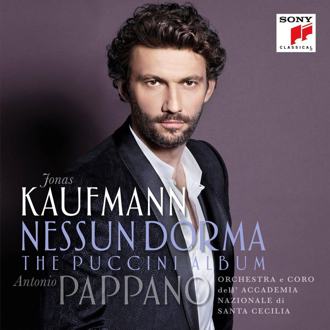|
|
|
|
|
|
|
|
|
The Times, September 11 2015 |
| Neil Fisher |
|
|
|
Jonas Kaufmann, Nessun dorma, The Puccini Album |
|
| The German tenor Jonas Kaufmann has so
commanding a lead in the battle for top global operatic personality that it
turns out that the only singer alive who could challenge the incoming
juggernaut of Kaufman’s Nessun Dorma: The Puccini Album is . . . Jonas
Kaufmann. |
| |

A few weeks ago his former record label Decca cheekily put out The Age of
Puccini under his name, a rehashed compilation of previously recorded
titbits. Kaufmann reacted on Facebook, badly. “Please don’t let yourselves
be deceived by this release,” he wrote (in three languages, for good
measure). “I was not consulted . . . This was done without my knowledge and
approval.”
To look at the deluxe CD edition of Nessun Dorma is to
realise just what is being invested by Sony, Kaufmann’s new label, in its
star signing. Calling the album after the unofficial anthem of the 1990
World Cup final — a holy moment for those tasked with selling classical to
the masses — is a hint. The bonus DVD doesn’t have opera clips on it, but
“music videos”. Pictures of Kaufmann show him not in his traditional concert
attire but what looks like Banana Republic’s entire autumn selection of
knitwear.
I’m still sceptical. Kaufmann isn’t interested in selling
his personality for the masses — in a sense, he’s too good an opera singer
to do that. On stage he is remarkably invested in character and text, in
other words in being somebody else rather than himself. The best of Nessun
Dorma — and Kaufmann’s best is peerless — shows how well he can do that even
on record, assisted by the vivid playing of the Santa Cecilia Orchestra in
Rome under Antonio Pappano.
The two rarities from Edgar and Le Villi,
probably chosen because they fit his dark-tinged voice better than some of
the plum Puccini numbers, are particularly superb: both depict men in the
grip of obsessions, and Kaufmann is always great as an obsessive lover. The
desperation and regret of his Dick Johnson from Fanciulla del West is also
thrillingly evoked and Pappano should make a Kaufmann-led revival of the
piece at Covent Garden a priority.
Yet just when you think the album
is going a little one-note, Kaufmann dials it down again, in the wide-eyed
optimism of Ruggero from La rondine, and even Rinuccio’s passionate credo
from Gianni Schicchi — normally given to a young lyric tenor — has an
impetuous swagger.
The only disappointment comes with the opening chunks
from Manon Lescaut, which reunite Pappano, Kaufmann and the soprano Kristine
Opolais from their London performances. As the poet Des Grieux, Kaufmann is
still as charismatic as he was on stage, but the extracts don’t hang
together and Opolais sounds strangely wan against Pappano’s over-dominant
orchestra. Sony should have cut back on photoshoots and saved its pennies
for a full and better-balanced studio recording of the complete work. (Sony
Classical)
|
|
|
|
|
|
|
|
|
|
|
|
|
|
|
|
|
|
|